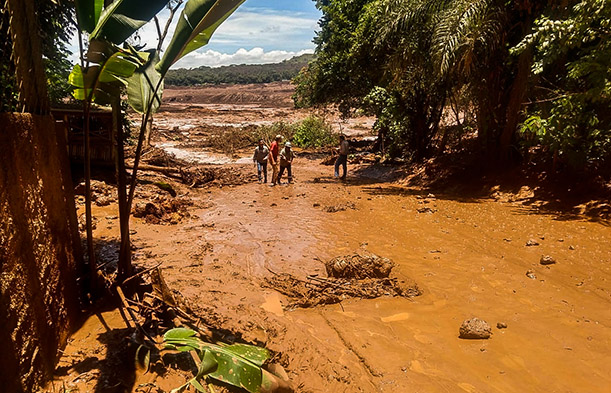This edited extract from Christian Aid Brazil Programme’s newsletter, updates and expands on the earlier article published by LAB. ‘The lessons of Brumadinho: put people before profits‘
July 29, 2019. Six months later, the municipality of Brumadinho still lives with pain and suffering. But also with an intense process of struggle for reparation, rights and justice. Learnings from Mariana were central to the affected population in terms of adopting more effective strategies, considering Vale’s predatory behaviour in both situations.
As 180 days have passed since the dam collapsed, the 944,000 people who have felt some or a lot of the catastrophic impacts of the disaster are still trying to get their lives back on track.
They live in communities in 18 cities by the banks of the Paraopeba River, which was hit by the toxic mud that flowed 305 kilometers – nearly 200 miles – down the stream until it reached the city of Felixlândia.
For the coordination of the Movement of People Affected by Dams, having succeeded in guaranteeing the direct participation of those affected in the negotiation process – mainly in the judicial hearings – it was essential to stop Vale’s attempts to delay and neglect compensations, with the complicity of public institutions, as it did in the crime of the Doce River.
Removing Vale from central aspects of response, such as registration of affected families was central to dismantle the strategy of shielding the company and postpone responsibility for the rights of those affected, according to MAB. Recently, courts have approved the establishment of Independent Technical Advisory groups, selected with the participation of affected families, who will undertake thorough and long-term assessment on different dimensions of the impact from the rupture (socioeconomic, environmental, public health, working condition, etc) to be able to determine the company’s responsibility beyond deceased workers and immediate effects. National and International articulation and pressure have advanced other aspects of the case and can impact the mining sector as a whole.
Vale firms deal with workers and their families
In July 15, the Public Ministry of Labour (MPT) has finally struck a deal with Vale related to workers on Mina do Feijão facilities and their families. Within the limits of the Brazilian Labor Court, affected families and MAB believe that the terms of the agreement are positive. They highlight it is the result of the struggle and mobilization of families, and the efforts of the victims to seek a collective agreement with the participation of the unions as representative entities of the workers. They emphasize, nonetheless, that the amount destined to the victims and their families is still negligible given Vale’s high profitability, having been computed only last year the value of R$ 25 billion (around 6.5 billion USD) only with the Mina do Feijão mine. Moreover, compensation must move way beyond the families of the deceased up until all families who are suffering the consequences of the disaster. Finally, despite many achievements, the agreement signed between Vale and MPT presents several points without details and clarification. Issues such as healthcare for family members and moral damages to workers who survived are still not clear in the document. Collective organization was important in this process, so collective moral damages must respect processes of participation with the group of family members of the victims.
See Details of the agreement here
Environmental reparation
A judge in Brazil has ordered Vale to pay compensation for all damages caused by the collapse of the Brumadinho dam in January. The judge did not set a figure for the compensation but said that the company was responsible for fixing all the damages including the economic effects.
Judge Elton Pupo Nogueira also said that $2.9bn (£2.3bn) of Vale’s assets frozen by courts should remain blocked. He said the funds should be used to make compensation payments to affected families and businesses. Part of the funds however have been unfrozen following the agreement with the Public Labour Prosecutor. Explaining why he had not specify an amount for Vale to pay out, he argued that technical and scientific criteria were not enough to quantify the effects of the collapse. “The value [of the compensation] is not limited to the deaths resulting from the event, it also affects the environment on a local and regional level as well as the economic activity in the affected region.”
Vale’s continued operation and other dams at risk
Vale continues to operate in Brumadinho. Besides the Mina do Feijão mine, which was shut down after the dam break, the company also operates four reserves in the area, where there are 308.5 million tons of high-purity iron ore.
In the first quarter of 2019, Vale extracted 72.87 million tons of iron ore. In May, iron ore prices hit US$100 per ton, a five-year high. The company is the global leader in iron ore and nickel production. In ten years between 2008 and 2017, it recorded approximately US$57 billion in profits. Almost all minerals extracted in Brazil are for exports. In 2018, Vale recorded US$6.86 billion in annual net income and produced 384.6 million tons.
While the company puts in efforts to expand its operations to other areas in the country, 80 percent of its 133 iron ore dams are located in Minas Gerais. Currently there are four Vale dams at high risk of imminent collapse. In one of the dams, in the city of Barão de Cocais, thanks to the organization of local families with support from MAB, many local demands are being addressed by Vale, such as the repair of public infrastructure and dredging of the local river. Vale reports providing temporary shelter to 1,184 families in the Brumadinho area and other risk areas in Minas Gerais, but the number of impacted people is well greater than that.
Transparency and disclosure
The Investor Mining & Tailings Safety Initiative, chaired by the Church of England Pensions Board and the Swedish Council of Ethics of the AP Funds has led to two interventions. The first was a call, supported by funds with over $6 trillion in assets under management, for a new independent and publicly accessible international standard for tailings dams based upon the consequences of failure. As a response a global review was announced and co-convened by the International Council on Mining and Metals (ICMM), the Principles for Responsible Investment (PRI) and the United Nations Environment Programme (UNEP). The second intervention is the letter sent by a group of 96 institutional investors (representing more than $10.3 trillion assets under management) to 683 extractive companies seeking greater disclosure on the management of tailings storage facilities (“TSF”). As of 5th July 2019, 34 of the top 50 mining companies have made disclosures which has resulted in information about thousands of individual tailings dams/facilities being made public on company websites. Of the 651 companies contacted the breakdown of responders were: a) 218 responded (representing 31% of the companies contacted); b) 126 confirmed they did not have tailings facilities (representing 23%); c) 92 confirmed they did have tailings facilities; d) 25 companies have not yet published their disclosure on a website or have asked for extra time to complete their disclosure; f) 433 did not respond (representing 69%). Vale was one of the companies that responded, including information from state of current TSF (including in the Amazon), safety procedures and ongoing evacuation efforts.


